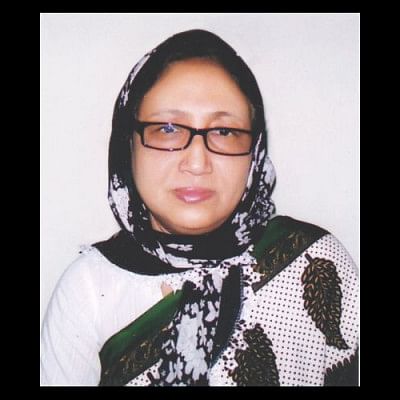Leading the way in judicial services

Back in 1984, women in judicial services was a rare sighting. But that did not stop Kabita Khanam from joining as a BCS judicial cadre official.
“When I joined office, everyone was skeptical of my abilities in the courtroom,” said Khanam, the first female election commissioner in Bangladesh.
“Such surveillance by others prompted me to perform my duties properly and efficiently,” she said sharing tales of initial struggle in her career in an interview with The Daily Star.
“It was always on the back of my mind that if I performed poorly, people would say it was because I was a woman. But as the days went by, I started gaining the confidence of my colleagues and others around me by proving my skills and merits.”
In her 32-year career, she was easily promoted from one post to the next and finally retired as district and sessions judge in 2016.
On the challenges of building a career in a male-dominated society, Khanam said, “I did not have any bitter experience of harassment by male colleagues or bosses. I believe that if a female officer is bold, has the skills and merit, and is sincere in her work, she has very little to worry about.”
“That is why, I request women to prove their worth in the workplaces with merit and skills.”
Support from the family is the most important aspect of developing a woman's career, said Khanam. “Without her father or husband's support, it is impossible for a girl to climb the career ladder.”
The atmosphere at work and attitude of male colleagues is another deciding factor, she added. “When a woman feels comfortable in her working station, she will deliver better services.”
Daycare facilities for the children of working women are necessary at every office -- both public and private, she said.
“In Bangladesh, many women quit their jobs to take care of their children. If they could get daycare facilities at their offices, many women would continue working.”
Khanam said females working in garments and the construction sector are deprived of rights and dignity. “They work hard, but are poorly paid. We together must raise our voices for them,” she said.
On the challenges she faces as the first female election commissioner, Khanam said, “Presenting free and fair elections to our countrymen is the top challenge for me.”
“The president has appointed me. I want to prove that women can do everything. I wish to perform so that the president appoints a woman for the post of chief election commissioner in the future,” said Khanam, who studied at Rajshahi University.
The president, on February 6, appointed new Chief Election Commissioner KM Nurul Huda and four other election commissioners, including Khanam, for the next five years. The new commission will oversee the 2019 national elections.

 For all latest news, follow The Daily Star's Google News channel.
For all latest news, follow The Daily Star's Google News channel. 



Comments